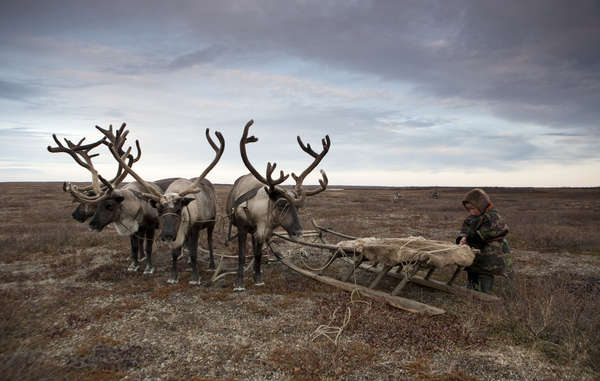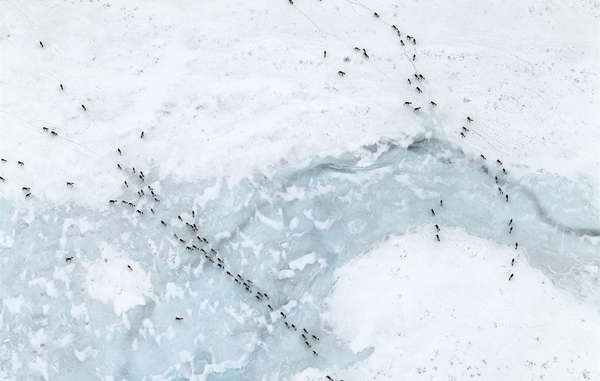This video presents “Caribou Migration 16mm 1 – Reindeer Herd – Best Shot Footage – Stock Footage”:
- “Caribou Migration. Caribou Swimming Through Water
- The reindeer (Rangifer tarandus), also known as the caribou in North America, is a deer from the Arctic and Subarctic, including both resident and migratory populations”
The Canadian reindeer herd, known as caribou herd in North America, is on the path towards extinction.
Presently, reindeer or caribou is an endangered species in Canada because:
- Canada’s George River Herd once numbered 8-900,000, but a recent government survey found only 27,600 animals survive
- In October 2010, the George River migratory caribou herd’s total population was estimated at roughly 74,000 animals
- July 2012 survey confirms an ongoing decline of the George River migratory caribou herd population over the past few years
- The total herd population is currently estimated at approximately 27,600 animals
-
Other herd health indicators, such as adult survival rate and calf recruitment rate, are also being monitored by the biologists, who believe the herd’s population could fall to less than 25,000 animals by October 2012
-
- The total herd population is currently estimated at approximately 27,600 animals
- Canada’s promotion of industrial projects on its land has destroyed large tracts of the reindeer’s grazing grounds, heavily disrupting migratory routes
SURVIVAL INTERNATIONAL PRESS RELEASE
December 3, 2012
Christmas crisis for Canada’s iconic reindeer herd

© Steve Morgan
A reindeer herd which was once the largest in the world has shrunk to a fraction of its former size, official surveys have revealed.
Canada’s George River Herd once numbered 8-900,000, but a recent government survey found only 27,600 animals survive.
The herd’s unprecedented and dramatic decline has left local indigenous people fearful for its survival.
A ‘tsunami of factors’ has been blamed for the decline, which government ministers have called ‘significant and frightening.’
The reindeer, known as caribou in North America, is central to the lives and culture of many indigenous peoples in the sub-Arctic. The 63% population drop just in the last two years has left many of them shocked.
Speaking to Survival, George Rich, an elder from northeast Canada’s Innu people, said, ‘one of the major factors is continued mining and mineral exploration.
‘For example, Quest Minerals has recently announced that it wants to build a road through the heart of the calving grounds, as well as flying helicopters and planes back and forth from exploration sites.’
Canada’s promotion of industrial projects on its land has destroyed large tracts of the reindeer’s grazing grounds, heavily disrupting migratory routes.

© Subhankar Banerjee/Survival
The herd’s decline has led some biologists to blame indigenous hunting practices. However the Innu, who have co-existed with the caribou for thousands of years, have been quick to defend themselves.
Rich said, ‘the government always blames the Aboriginal people, but we are deeply connected to the caribou and have lived with them for generations.’
Many Innu are calling for greater control over their territories and resources, and to be treated as equals in decisions that affect their lands and the animals that live there.
Stephen Corry, Survival’s Director said today, ‘It’s easy to blame indigenous peoples for over-hunting because they’ve usually no voice to defend themselves from these accusations. Yet it’s been proven in countless studies that they are the world’s best conservationists. When will governments and scientists realize this? We need to start listening to what indigenous peoples have to say about matters on their own land: they know best.’
Survival International helps tribal peoples defend their lives, protect their lands and determine their own futures. Founded 1969.
——————————————
You may also want to know:
